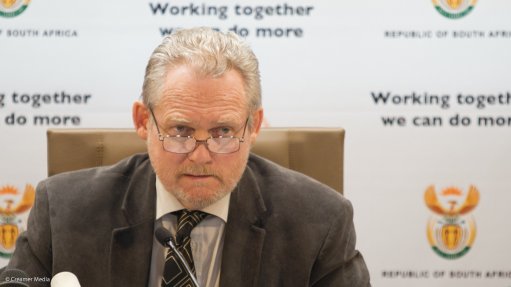
Trade and Industry Minister Dr Rob Davies
Photo by: Duane Daws
National Treasury has issued instruction notes to all government departments and State entities making the local procurement requirements set out in the designation of electricity meters and boats by Trade and Industry Minister Dr Rob Davies earlier in the year binding, the DTI said.
Davies stated that South Africa had the capacity and capabilities to manufacture smart meters locally to the required standards.
“It has proved difficult in this space to get accurate economic data but it is safe to state that there has been significant import leakage. In other words, public procurement has been spent on imported products in conditions where local manufacturers have the capacity to manufacture locally, at competitive prices,” the Minister noted.
He said the designation of electricity meters and set-top boxes for digital migration, the localisation possibilities arising from the roll-out of broadband and the provision by government of a range of other policy measures inclusive of incentives, would contribute to the creation of an enabling environment to significantly grow the domestic electro-technical sector.
“A supportive effort by the South African Bureau of Standards, which has been at the global frontier of this work, has ensured that the requisite standards for the industry have been set. Work by the National Regulator for Compulsory Specifications is also under way to ‘lock-out’ substandard and unsafe products in this sector, among others, in the interests of consumers,” Davies said.
Meanwhile, the Minister stated that boatbuilding had been identified as a strategic industry with strong and extended linkages for economic growth and with significant employment multipliers.
“It is critical that South Africa retains and builds its capacity and engineering and technical capabilities to manufacture a range of ‘working’ vessels, to required global standards.
“The Operation Phakisa process, which is due to conclude shortly, will also seek to ensure that government strengthens the general enabling environment, including with respect to infrastructure and services provided at ports by the Transnet National Ports Authority,” said Davies.
Research had indicated that government and State-owned companies had spent R19-billion on working vessels since 1994; however, only R900-million of this was spent locally.
Davies indicated that the designation of boats for local procurement was a significant step towards greater support for the industry, while also making provision for the importation of components not produced in South Africa.
The DTI would also “step up” its work with boat builders in South African to ensure that further effort and conditional support measures go into increasing local manufacturing capabilities, especially with respect to components higher up the technology and value chain.
Davies further stated that, in keeping with similar policies in many other jurisdictions, government was “resolutely committed” to supporting local manufacturers with a range of local procurement instruments.
“These designations are part of this broader effort and must be accompanied by commitments from manufacturers to raise competitiveness, including in relation to export markets. Government also, once again, calls on large companies with significant procurement budgets to support the buy local, ‘Buyback SA’ campaign, including in this sector,” he commented.